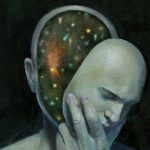Awareness and non-duality
Non-duality is a western translation of the eastern word “Advaita” which means “not-two”. Some people might say it points to something which could be called “wholeness” or “unity” or “Divine” but there is a reason it is defined as a negative! We human constantly think and act in terms of difference, duality and opposition. Non-duality points “beyond” that. What it points to is actually indefinable, unknowable and nameless and yet it is always already present everywhere as the very “principle” of Existence itself. (so to say) Non-duality is not a philosophy, not a belief. If anything it would rather be the end of all belief systems! Perhaps it’s better then to elaborate on the concepts of “duality” and “difference”.
To understand the concept of duality we can look at the core experience of “being the body”. Soon after we are born into this world, we begin to experience this duality. There is “me”, and then there is “everything and everyone else”. We experience that the borders of the “me” are marked by our physical body.
The fact that “my physical body” is physically different from other physical bodies or objects is not disputed. However, how about this “non-physical” self? Is there such an object somewhere, does it exist at all?
When we use common language we say things like: “I’d like to drink something”. We do that, because we experience thirst in our body. Our nervous system tells our brain that we need water. So in other words, we equate the body with “me”. However where in the body is this “self” located? No neurosurgeon has ever been able to find it.
Since we use the word “I” all the time, as in “I feel good”, “I love you”, “I need a job” etc., we suggest that there is actually a “self” which exists somewhere inside of us. Or could it be that this is just a side effect of language and the way we use language to describe “objects” and “reality”?
Let’s make it a bit more “immaterial”. We can say: “I am thinking about this or that”. When we use neuroimaging systems, we can see that certain parts of the brain light up when people think or perform mental tasks. There is physiological activity which correlates with those thought processes, but we would not go so far that we say “thought = matter”. Clearly thought is immaterial, even if the brain activity can be measured in physical terms.
So then is the “self” a conceptual thing, created by the brain? Just like thoughts are?
Well, that is exactly what some people in the science community are saying. It corresponds to what “mystics” and some “meditators” have experienced too. The idea of a “self” is an illusion! That is actually a shocking statement! So what about the famous statement by Descartes: “cogito ergo sum”? Well in fact, it perfectly matches these insights. The fact that we can “think” means that we can create a conceptual construction of “self”. The following video by neuroscientist and philosopher Sam Harris is really interesting to watch.
Thinking is not equal to consciousness
A common misconception is that awareness is equal to “thinking” or “knowing”. This is obviously false, as it is possible to be aware of a beautiful sunset and be marveled by it, without any rational thinking going on. It is also possible to be aware of your own thoughts, which raises the question: who or what is aware? Is there a more accurate way to describe what is going on? Perhaps we should use the word “perceiving” or “sensing”. There is seeing the sunset, smelling the rose, hearing the music, feeling the warmth of the sunlight, and it all happens to an apparent “me”.
Language is a very limited tool to describe reality and introduces many pitfalls, but it seems more accurate to say that awareness has to do with “being”, rather than rational analysis and thinking. Thinking itself however occurs somewhere. We are aware of what we think. That by the way does not mean, that we know what we “will” think next. It seems to be a rather spontaneous process. So you might wonder, “who” is it, who is thinking. Is it “me” or is it my brain, doing it’s thing? Then who is this “me” who is observing or witnessing the thinking? Is there any “self” actually who has any thoughts? A profound question really.
A useful definition of Awareness might be:
- Awareness = “being” without “knowing” (conceptual thinking)
No center that we can call the self?
Many mystics or whatever you want to call them, have realized that there is no separate self and that Awareness or “Being” is boundless. They have also reported that such “being” is much more profound than our common experience as a “me” in the world. Some of them have said that in this “limited awareness”, we live like a “dreamer”, we feel separate from “All that there is” or “Existence”.
Are such people delusional or is what they point to a very real “recognition” which can occur when we see through the illusion of a “separate self”? You may have reactions, concepts or beliefs regarding that. The whole point of this article though, is to point to what or who you are without all the concepts and beliefs you may have!
~~~
PS: also be sure to take a look at the Remarkable Quotes section, where we post Insights from a broad spectrum of people who have communicated remarkable Insights over the ages.
Want to respond of read recently added articles? Please see the BLOG.

